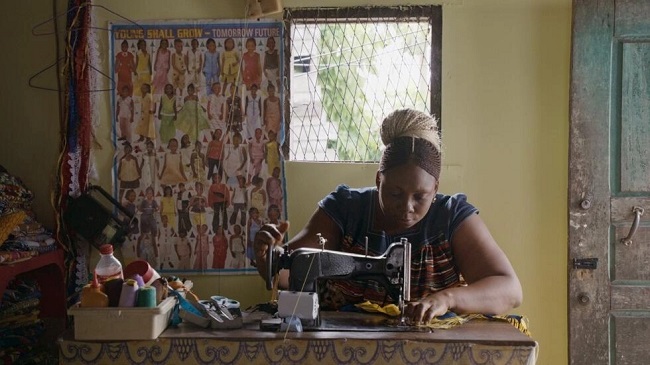Cannes spotlights Mambar Pierrette: ‘It’s high time Cameroonian stories influence world cinema’
In the Directors’ Fortnight, which runs parallel to the main festival, Rosine Mbakam’s “Mambar Pierrette” painted an intimate portrait of a Cameroonian seamstress and single mother struggling to make ends meet against a backdrop of social hardship and the threat of floods.
Pierrette Aboheu Njeuthat stars as the titular character, a mother of three who works tirelessly at her sewing machine to provide for her children while customers and neighbours linger in her small shop, sharing their joys and disappointments in a deftly woven tapestry of communal life in the city of Douala.
A remarkable debut feature based on the life of Mbakam’s seamstress cousin, “Mambar Pierrette” draws on the director’s experience of documentary filmmaking, which has previously explored the themes of kinship and migration to Europe. FRANCE 24 spoke to the filmmaker about her focus on character studies and her commitment to promoting African stories in the moviemaking industry.
“Mambar Pierrette” is your first feature-length fiction film, although it is based on your cousin’s life. Where do you draw the line between documentary and fiction?
I drew inspiration from Pierrette’s life to write the script, placing it at the very heart of the film. Once we started shooting, the other characters also added their input, bringing the screenplay closer to their own lives.
Fiction never takes over. Its role is to add substance to the narrative and provide more context. In particular, the fictional element helps underscore the fact that Pierrette’s social predicament is not only a result of her small income, her husband’s irresponsibility or Cameroon’s politics. It is also derived from an enduring neo-colonialism that leaves swaths of the population in poverty.
The fabric shop is at the heart of your film. What does it symbolise?
My film tells the story of Pierrette, who is a seamstress in real life. Sewing embellishes, it brings people together, and her workshop is a place where people open up and share their secrets. I wanted to highlight the value of this work of dressmaking and transformation, which has all but vanished in the West. We shop, but we have lost this relationship with what we wear.
The sewing room also represents gender relationships in Cameroon. The men remain in the entrance, at the door, while the women establish themselves in the workshop, inhabiting the space. These opposing stances signal the contrast between a new generation of women who are increasingly assertive and men who don’t accept this reality – and are therefore in a vulnerable situation. Pierrette doesn’t sew for women only, she works for everyone, her workspace excludes nobody. By keeping at a distance, the men seek to protect themselves and avoid questioning their position in society.
Culled from France 24




